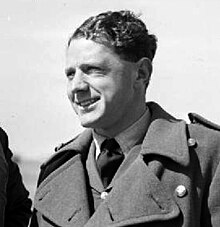Caesar Hull
| Caesar Hull | |
|---|---|

Hull at RAF Wick in Scotland in early 1940
|
|
| Birth name | Caesar Barrand Hull |
| Born |
26 February 1914 Near Shangani, Southern Rhodesia |
| Died | 7 September 1940 (aged 26) Purley, Surrey, England |
| Place of burial | Tangmere, Sussex, England |
| Allegiance |
|
| Service/branch | Royal Air Force |
| Years of service | 1935–40 |
| Rank | Squadron Leader |
| Service number | 37285 |
| Unit | |
| Commands held | No. 43 Squadron (September 1940) |
| Battles/wars |
Second World War |
| Awards | Distinguished Flying Cross |
| Other work | Member of South African boxing team at the 1934 Empire Games |
Second World War
Caesar Barrand Hull, DFC (26 February 1914 – 7 September 1940) was a Royal Air Force (RAF) flying ace during the Second World War, noted especially for his part in the fighting for Narvik during the Norwegian Campaign in 1940, and for being one of "The Few"—the Allied pilots of the Battle of Britain, in which he was shot down and killed. From a farming family, Hull's early years were spent in Southern Rhodesia, South Africa and Swaziland. He boxed for South Africa at the 1934 Empire Games. After being turned down by the South African Air Force because he did not speak Afrikaans, he joined the RAF and, on becoming a pilot officer in August 1936, mustered into No. 43 Squadron at RAF Tangmere in Sussex.
A skilful pilot, Hull dedicated much of his pre-war service to aerobatics, flying Hawker Audaxes, Furies and Hurricanes. He reacted to the outbreak of war with enthusiasm and achieved No. 43 Squadron's first victory of the conflict in late January 1940. Reassigned to Norway in May 1940 to command a flight of Gloster Gladiator biplanes belonging to No. 263 Squadron, he downed four German aircraft in an hour over the Bodø area south-west of Narvik on 26 May, a feat that earned him the Distinguished Flying Cross. He was shot down the next day, and invalided back to England. Hull returned to action at the end of August, when he was made commander of No. 43 Squadron with the rank of squadron leader. A week later, he died in a dogfight over south London.
...
Wikipedia
